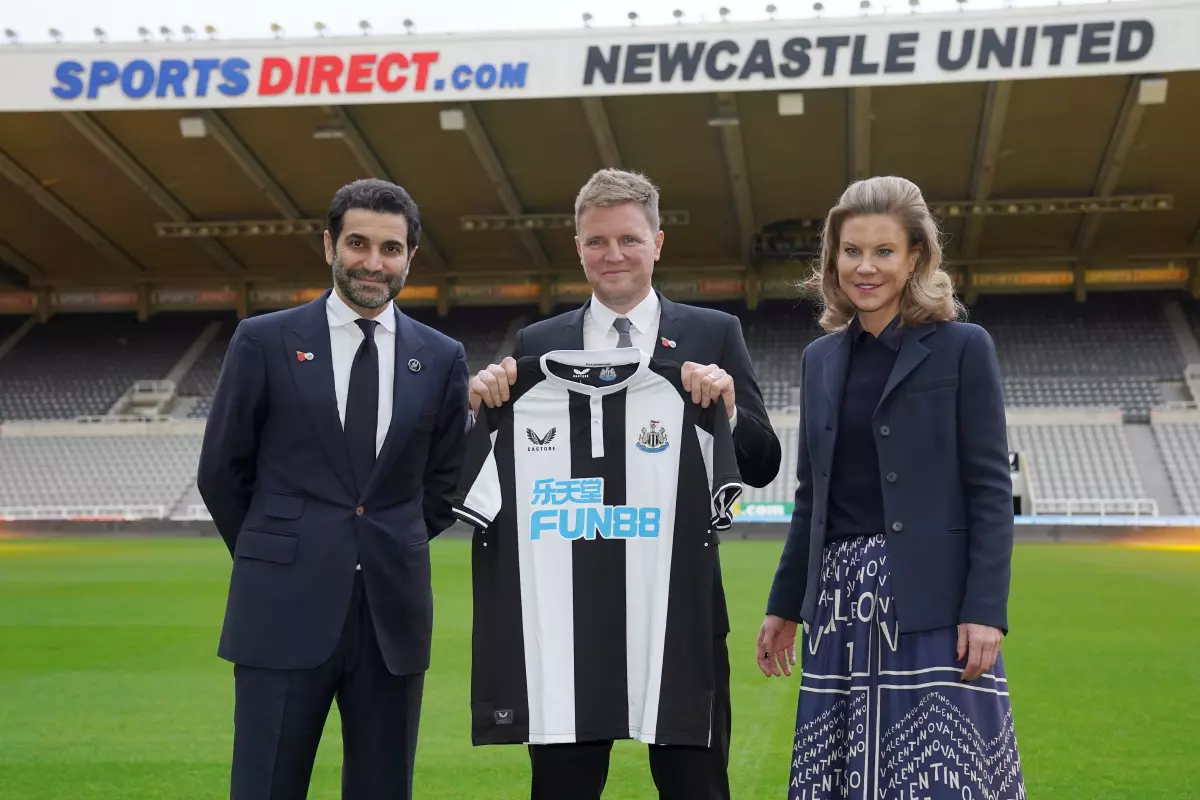A look back at Newcastle's first year as one of the richest football clubs in the world

Newcastle club director Amanda Staveley and husband Mehrdad Ghodoussi (left) with newly appointed Newcastle United manager Eddie Howe
Newcastle’s new owners celebrate a year in charge of the Premier League Club at St James’ Park on Friday.
To the black and white faithful, who had willed someone, anyone to buy out Mike Ashley after years of watching the club drift, their presence is cause for hope and excitement, while, beyond Tyneside, there remains discomfort.
Here, the Planet Sport takes a look at what has changed on Gallowgate over the last 12 months.
The hierarchy
When Amanda Staveley's consortium, which comprises the financier's PCP Capital Partners, Saudi Arabia's Public Investment Fund and the Reuben Brothers, completed their £305million takeover on October 7 last year, they took on a mammoth task. They inherited an unpopular head coach, an unbalanced squad, a sub-standard training base and a disaffected fanbase. But where Ashley had operated at arm's length, they, and in particular Staveley and husband Mehrdad Ghodoussi, have stood front and centre to spearhead the first stages of a mission which has captured the imagination of the Geordie public and allowed them to dream once again.
The boss
Just 13 days after the takeover had been sanctioned, Steve Bruce was put out of his misery. Installed to less than popular acclaim as Rafael Benitez's replacement during the summer of 2019, he never managed to win over his most vociferous doubters and, in the end, his departure proved a merciful release. Having been turned down by initial choice Unai Emery, they handed Eddie Howe the reins and have since been rewarded handsomely. Aided in no small part by a huge cash injection, he has revitalised a squad which had battled manfully to retain the club's top-flight status, but which was crying out for new blood. Howe has put smiles back on the faces of his players, introduced a more progressive brand of football and blended astute signings with existing players performing way above their previous levels to send optimism through the roof.
The players
Howe's signings - Kieran Trippier, Chris Wood, Bruno Guimaraes, Dan Burn and Matt Targett in January and Nick Pope, Sven Botman and Alexander Isak during the summer - have cost the club around £210million, but much of it has proved money well spent. Pope, Trippier and Guimaraes in particular have made significant impacts, although just as important has been the form of Fabian Schar, Jonjo Shelvey and Joelinton, a man branded a £40million flop as a striker, but one who has excelled since being converted to a powerhouse midfielder.
The fans
Rejoicing was unbridled on Tyneside the night the Ashley era drew to a close. The sportswear tycoon's relationship with the supporters had grown increasingly toxic after 14-and-a-half years of relatively meagre investment and under-achievement. In an instant, hope was restored as owners with both genuine ambition and the funds to support it signalled their intention to regain ground lost during his tenure and, although they have found themselves in the firing line as a result of the source of much of the club's wealth, the prospect of Newcastle competing for prizes once again - however distant that may be - has sparked an excitement not seen since the height of the Sir Bobby Robson era.
The criticism
The fact that PIF, Saudi Arabia's sovereign wealth fund, holds an 80 per cent stake in the club - a matter which taxed Premier League chiefs as they carried out their owners' and directors' test - has led to significant criticism. Human rights campaign group Amnesty International has highlighted its ongoing concerns over human rights abuses in Saudi Arabia and repeatedly accused the Gulf state of "sportswashing" through their involvement, while commentators have questioned the club's decision to travel to Jeddah for a warm weather training camp earlier this year and the choice of a third kit which mirrors the Saudi national team's colours. Newcastle have worked hard on inclusivity measures during the intervening 12 months and have brought their women's team under the same umbrella as the men, but the wider issues remain.


